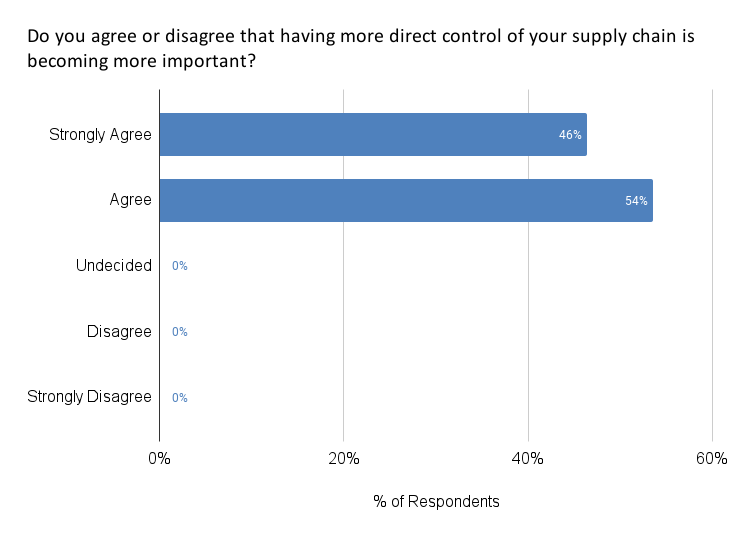As I highlighted in a November 2021 post titled “Taking More Direct Control Of Your Supply Chain,” over the past few years, there have been several examples of companies retaining or taking more direct control of their supply chain and logistics operations. More recently, for example, we’ve seen retailers buying logistics service providers, like American Eagle Outfitters buying Quiet Logistics for $350 million and BJ’s Wholesale Club acquiring the assets and operations of four distribution centers and the related private transportation fleet from Burris Logistics.
Is taking more direct control of your supply chain becoming more important?
We asked members of our Indago supply chain research community those questions back in November 2021 and all our member respondents either “Agreed” (54%) or “Strongly Agreed” (46%) that having more direct control of your supply chain is becoming more important.

Is this move by companies to take more direct control of their supply chains a temporary change or a lasting shift in strategy? Does outsourcing necessarily mean loss of control?
“I think taking more control of supply chains will definitely be a focus for some companies,” said one supply chain executive. “From our perspective, we are not making significant, wholesale changes to our supply chain. However, we are making small tweaks to mitigate supply chain risk, such as increasing safety stocks and lead-time settings, engaging with alternative suppliers, etc.”
Here are some other value-added comments from our Indago members, who are all supply chain and logistics professionals from manufacturing, retail, and distribution companies:
“I think even as we normalize (in late 2023 would be my guess), we will still need to be flexible, reliable, and resilient, so it’s a lasting shift. Outsourcing does mean a loss of control to an extent, but it doesn’t mean it’s the wrong play. There are a number of factors to weigh.”
“Outsourcing, from my perspective, is not always the bad thing that it is made out to be. The reason is, ultimately every company needs to focus on its core strengths and capabilities and outsource what it considers less critical or important to its overall strategy. I think this is a lasting shift in strategy; companies are [realizing] that they need to focus more on what they do or do not want to control in their supply chain and whether or not it makes sense with their business strategy and/or can save costs in their business.”
“From my perspective, it’s a lasting shift. Overall, tradeoffs for a strategic shift in controlling the supply chain will have to be sustainable and deliver value. No, outsourcing doesn’t equate to a loss of control. There are valuable gains to be achieved via third-party people, processes, and technology.”
We also asked our Indago members, “What actions, if any, are you taking to obtain more control?” The results of that question are available to Indago members only.
So, do you agree or disagree that having more direct control of your supply chain is becoming more important? Is your company taking any action to take more control? Post a comment and share your perspective and experience!
Join Indago
If you’re a supply chain or logistics practitioner from a manufacturing, retail, or distribution company, I encourage you to learn more about Indago and join our research community. It is confidential, there is no cost to join and the time commitment is minimal (2-5 minutes per week) — plus your participation will help support charitable causes like JDRF, American Logistics Aid Network, American Cancer Society, Feeding America, and Make-A-Wish.
You can also follow us on LinkedIn to stay informed of our latest research results and news.










